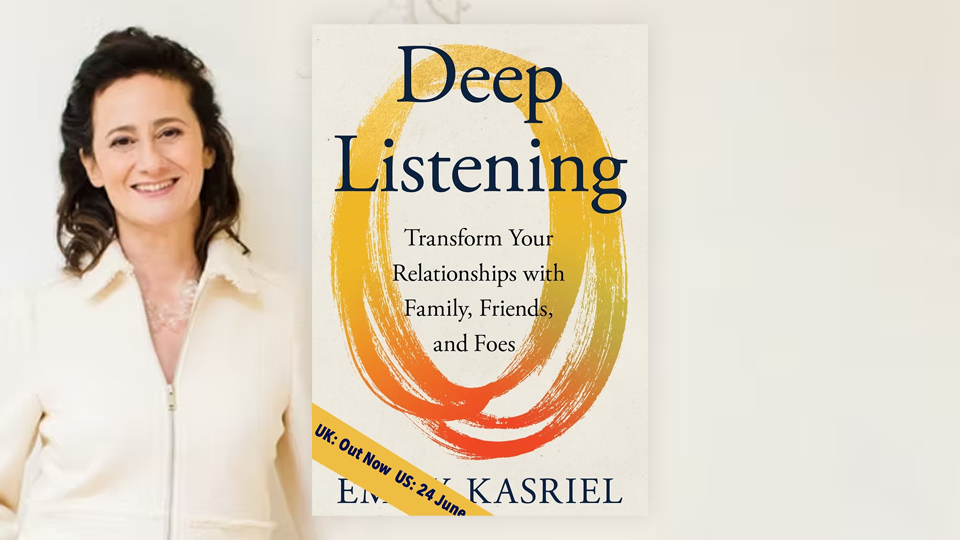

Public speaking is a frequent yet challenging task for most. A 2023 poll found that nearly half of the British public (49%) fear speaking in front of people, and the public speaking training industry is booming in response. Yet, in today’s era of uncertainty and change, perhaps we should shift our focus away from speaking and more towards listening. This is the case put forward by Emily Kasriel in her new book, Deep Listening, along with practical guidance on how to listen better.
As a Visiting Senior Research Fellow at King’s College London Policy Institute and executive coach, Kasriel’s writing is rooted in scientific evidence and lived experience. Grounded in academic research and with insights from eminent political figures, psychotherapists, spiritual leaders, artists, writers, choreographers and mixed with Kasriel’s own personal reflections, Deep Listening takes the reader on a cultural expedition, via Japan, South Africa, Canada and many more places, to learn about the deceptively profound topic of listening.
In contrast to the routine listening typical of many conversations, Deep Listening is described as a ‘rich and multilayered process’, with eight essential ingredients – space, self-awareness, presence, curiosity, a warm gaze, silence, reflection, and depth. Moving beyond the pretence of listening, past the performance rituals of pretending to listen, the reader is guided towards a deeper, transformational approach.
Deep Listening does not indicate surrender, or capitulation to a power imbalance. Nor does it signal endorsement, obedience, or agreement. Rather it demonstrates listener autonomy, self-awareness, and empowerment.
The power of listening is also explored from the perspective of the speaker. Research and personal stories highlight how listening well impacts the speaker’s wellbeing. It shows how the quality of listening influences what a speaker chooses to share, how they share it, and how they then make sense of their emotions. In this way, the listener is not a passive bystander but an active agent. A tale on the impact of listening on stammering concludes, ‘it takes two to stammer’.
Deep Listening is not for every scenario, it is explained, but it is for everyone, regardless of cultural, neurological, or other individual difference. Different people can listen well while honouring their identity, it is emphasised. Yet perhaps a little more space might be dedicated to how we recognise different ways of listening among the pages. For example, as the book suggests, individuals with ADHD might find practice, keeping interruptions short, and asking for understanding help foster an environment in which speakers feel listened to. However, a willingness on the speaker’s part to educate themselves and recognise different, but just as powerful, listening may hold equal value.
While cookie cutter models are explicitly cautioned against, it is also worth wondering if some readers may interpret the eight ‘steps’ as a procedural means to an end, or even if the quality of their listening might be diminished by simply trying too hard. Nevertheless, as research cited in the book demonstrates, most people are not as good at listening as they think, and listening is oftentimes taken for granted. In response, Deep Listening offers a helpful, practical guide so we can learn to listen better.
Deep Listening is both practical and inspirational. Coaches will undoubtedly enjoy its heartfelt exploration of the multifaceted benefits of listening, as well as its practical tools, reflective questions, handy chapter takeaways, and charming illustrations on how to listen better. We hope you enjoy this book as much as us.
Visit emilykasriel.com for more details.
Review written by Nina Hobson, Barefoot in-house coach and tutor.
Enjoying these insights? Get more free tips and expert perspectives delivered straight to your inbox.
SIGN UP FOR UPDATESGet to Know Barefoot Coaching
Making the world a brighter place through exceptional coaching.
ABOUT US
Enjoying these insights? Get more free tips and expert perspectives delivered straight to your inbox.
SIGN UP FOR UPDATESGet to Know Barefoot Coaching
Making the world a brighter place through exceptional coaching.
ABOUT US

Chief Executive Office - MBA, PCC


Develop your coaching skills with ICF Level 2 accredited training — blending tools, psychology, and practice, grounded in real coaching experience. Open to all backgrounds, with University of Chester options.

Our workplace coaching offer develops leaders and teams through practical tools, psychology, and real coaching expertise — building cultures of trust, resilience, and performance across every organisation.

Our Leader as Coach programme equips leaders with coaching skills to inspire, engage, and empower. Blending theory with practice, it transforms everyday conversations into opportunities for growth.

This dynamic programme blends advanced learning on group and team dynamics with practical coaching experience — empowering you to coach teams confidently. Accredited with 40 ICF CCE points.

This pioneering programme builds the skills, insight, and empathy to coach clients through grief and loss in all its forms. Accredited with 40 ICF CCE points.

This university approved programme equips experienced coaches to become professional supervisors, guiding others with reflective, ethical, and practice-based methods. Accredited with 40 ICF CCE points.

Our open group supervision offers practising coaches a reflective, structured space to refresh, align ethically, and gain perspective. Put 10 hours of Coaching Supervision towards ICF Core Competencies.

Our bespoke one-to-one coaching unlocks personal and professional potential, fostering lasting transformation through a trusting, confidential relationship — far beyond a transactional experience.

This transformative programme supports women in organisations to thrive professionally and personally, overcoming barriers like people-pleasing and impostor syndrome while challenging norms and unlocking growth.

Our Leader as Coach programme equips leaders with coaching skills to inspire, engage, and empower. Blending theory with practice, it transforms everyday conversations into opportunities for growth.

This dynamic short course equips accredited coaches to facilitate group coaching, supporting shared learning in safe, confidential environments. Accredited with 14 ICF CCE points.

Our team and group coaching programmes help organisations unlock collective potential, fostering collaboration, challenge, and shared learning — complementing one-to-one coaching for systemic impact.

Join Andy Chandler, CEO of Barefoot Coaching, in this on-demand session exploring applied psychology in coaching — equipping leaders, coaches, and HR/L&D professionals with practical tools to boost performance.

This year-long programme supports accredited coaches to launch, manage, or grow their coaching business, learning from experienced coaches and successful business owners. Accredited with 40 ICF CCE points.

A welcoming, foundation-level course introducing coaching techniques for personal and professional growth. No prior experience needed — open to anyone curious to explore coaching.

This dynamic programme empowers women to overcome people-pleasing and impostor syndrome. Through high-energy group coaching, participants build confidence, assertiveness, and the skills to thrive personally and professionally.
Posted onTrustindex verifies that the original source of the review is Google. I completed the Women’s Development Programme with Barefoot Coaching towards the end of 2024. It’s been an incredibly rewarding and insightful experience. Our course leader Julia was amazing, helping to create a safe and open environment for all those taking part. I wanted to do this programme with Barefoot to work particularly on managing feelings of imposter syndrome, and to also to build my confidence in both a professional and personal context. This course has provided me with the coaching tools and techniques required to overcome these boundaries and I’m excited to continue to implement these skills moving forward. I’d highly recommend this course to women of all ages looking to advance in all areas of life.Posted onTrustindex verifies that the original source of the review is Google. I recently completed the Women’s Development Programme and feel like I’m walking away with a clearer understanding of the importance of personal and professional boundaries and feel armed with strategies to push against self-doubt. I’d recommend this course to women struggling to manage challenging relationships and those wishing to break free from habits such as people-pleasing. I’m really looking forward to implementing my learnings and continuing to develop my approach to coaching communication. Thank you to the Barefoot Coaching team for this insightful experience!Posted onTrustindex verifies that the original source of the review is Google. I have just found my ‘Barefoot Coaching’ coaching cards from 2012, they are so valuable even after 9 years!Posted onTrustindex verifies that the original source of the review is Google. An amazing 12 days with the Barefoot Team working on Personal and Business Coaching. The tutors are incredibly knowledgeable, the theory wide-ranging and the practical sessions varied and valuable. I'd recommend this course and the Barefoot Team to anyone.Posted onTrustindex verifies that the original source of the review is Google. I chose Barefoot to consolidate my training as a coach in 2016. Everyone I spoke to beforehand about coach training providers said that Barefoot was the only choice - and they were so right Great tutors and course materials. Brilliant challenge and support. Excellent venues. You are made to feel part of Barefoot from day one . Lots of folk have said it, but life changing is the only way I can describe my experiences with Barefoot.Posted onTrustindex verifies that the original source of the review is Google. I recently completed the taught modules of the Postgraduate Certificate in Business and Personal Coaching with Barefoot. I wanted to be exposed to a broad range of coaching ideas, to have plenty of time to practice coaching and receive feedback and to meet like minded people who shared my passion. I was not disappointed. I loved every minute of the modules and was sad when the programme finally came to an end. Our cohort has been amazing and we continue to engage with each other via webinars and get togethers organised by ourselves. At no point in the process did I have any feeling that Barefoot was interested in selling places on this or other programmes. It was all about getting a good fit between you as a coach and their offerings. Great people. Very professionally run. Great materials. A good range of tutors from different backgrounds. All delivered with wonderful warmth and passion. Can't recommend highly enough.Posted onTrustindex verifies that the original source of the review is Google. What an amazing program, it has changed my life, I didn't know what I was going to use the training for or how it would change things for me or the people around me. It has proved the best decision yet 😁Posted onTrustindex verifies that the original source of the review is Google. I trained with Barefoot Coaching and can highly recommend the course. The breadth of learning and approaches, together with the great tutors and a very supportive cohort of students allowed me to challenge my existing thinking and develop as a coach in a way that was authentic to me. Completing the essays for Chester University also offered the opportunity to underpin the experiential learning with some academic rigor. The Barefoot team are all warm, friendly people and a pleasure to be around.Posted onTrustindex verifies that the original source of the review is Google. I did the PGCert course finishing in summer 2016. I had recently completed a degree in Psychology and wanted a course with academic grounding and accreditation. Barefoot surpassed all expectations - the teaching; the broad range of theories and tools ; the self development; the variety and enthusiasm of the intake; the excellent tutors and speakers. What I didn't anticipate was the support afterwards if you want it. For those that go into external coaching, it can be a lonely path. Barefoot offers routes to support that, be it coaching, supervision; CPD; alumni groups; conferences. I have just completed the Team Coaching course which was equally good. I believe the success of Barefoot lies in the passion of its originator, Kim Morgan, who is very evidently at the core of the business. All in all it was a wonderfully rewarding experience.Posted onTrustindex verifies that the original source of the review is Google. I trained with Barefoot Coaching back in 2014, on the back of a number of recommendations from colleagues. The course is a great mix of theory and hands-on work, led by a series of inspirational tutors, and there is a lively support system after completion, with supervision and conferences offered by Barefoot and a good alumni network. A brilliant course, highly recommended for anyone looking into a coaching qualification.Verified by TrustindexTrustindex verified badge is the Universal Symbol of Trust. Only the greatest companies can get the verified badge who has a review score above 4.5, based on customer reviews over the past 12 months. Read more

Develop your coaching skills with ICF Level 2 accredited training — blending tools, psychology, and practice, grounded in real coaching experience. Open to all backgrounds, with University of Chester options.

Our workplace coaching offer develops leaders and teams through practical tools, psychology, and real coaching expertise — building cultures of trust, resilience, and performance across every organisation.

Our Leader as Coach programme equips leaders with coaching skills to inspire, engage, and empower. Blending theory with practice, it transforms everyday conversations into opportunities for growth.

This dynamic programme blends advanced learning on group and team dynamics with practical coaching experience — empowering you to coach teams confidently. Accredited with 40 ICF CCE points.

This pioneering programme builds the skills, insight, and empathy to coach clients through grief and loss in all its forms. Accredited with 40 ICF CCE points.

This university approved programme equips experienced coaches to become professional supervisors, guiding others with reflective, ethical, and practice-based methods. Accredited with 40 ICF CCE points.

Our open group supervision offers practising coaches a reflective, structured space to refresh, align ethically, and gain perspective. Put 10 hours of Coaching Supervision towards ICF Core Competencies.

Our bespoke one-to-one coaching unlocks personal and professional potential, fostering lasting transformation through a trusting, confidential relationship — far beyond a transactional experience.

This transformative programme supports women in organisations to thrive professionally and personally, overcoming barriers like people-pleasing and impostor syndrome while challenging norms and unlocking growth.

Our Leader as Coach programme equips leaders with coaching skills to inspire, engage, and empower. Blending theory with practice, it transforms everyday conversations into opportunities for growth.

This dynamic short course equips accredited coaches to facilitate group coaching, supporting shared learning in safe, confidential environments. Accredited with 14 ICF CCE points.

Our team and group coaching programmes help organisations unlock collective potential, fostering collaboration, challenge, and shared learning — complementing one-to-one coaching for systemic impact.

Join Andy Chandler, CEO of Barefoot Coaching, in this on-demand session exploring applied psychology in coaching — equipping leaders, coaches, and HR/L&D professionals with practical tools to boost performance.

This year-long programme supports accredited coaches to launch, manage, or grow their coaching business, learning from experienced coaches and successful business owners. Accredited with 40 ICF CCE points.

A welcoming, foundation-level course introducing coaching techniques for personal and professional growth. No prior experience needed — open to anyone curious to explore coaching.

This dynamic programme empowers women to overcome people-pleasing and impostor syndrome. Through high-energy group coaching, participants build confidence, assertiveness, and the skills to thrive personally and professionally.
Posted onTrustindex verifies that the original source of the review is Google. I completed the Women’s Development Programme with Barefoot Coaching towards the end of 2024. It’s been an incredibly rewarding and insightful experience. Our course leader Julia was amazing, helping to create a safe and open environment for all those taking part. I wanted to do this programme with Barefoot to work particularly on managing feelings of imposter syndrome, and to also to build my confidence in both a professional and personal context. This course has provided me with the coaching tools and techniques required to overcome these boundaries and I’m excited to continue to implement these skills moving forward. I’d highly recommend this course to women of all ages looking to advance in all areas of life.Posted onTrustindex verifies that the original source of the review is Google. I recently completed the Women’s Development Programme and feel like I’m walking away with a clearer understanding of the importance of personal and professional boundaries and feel armed with strategies to push against self-doubt. I’d recommend this course to women struggling to manage challenging relationships and those wishing to break free from habits such as people-pleasing. I’m really looking forward to implementing my learnings and continuing to develop my approach to coaching communication. Thank you to the Barefoot Coaching team for this insightful experience!Posted onTrustindex verifies that the original source of the review is Google. I have just found my ‘Barefoot Coaching’ coaching cards from 2012, they are so valuable even after 9 years!Posted onTrustindex verifies that the original source of the review is Google. An amazing 12 days with the Barefoot Team working on Personal and Business Coaching. The tutors are incredibly knowledgeable, the theory wide-ranging and the practical sessions varied and valuable. I'd recommend this course and the Barefoot Team to anyone.Posted onTrustindex verifies that the original source of the review is Google. I chose Barefoot to consolidate my training as a coach in 2016. Everyone I spoke to beforehand about coach training providers said that Barefoot was the only choice - and they were so right Great tutors and course materials. Brilliant challenge and support. Excellent venues. You are made to feel part of Barefoot from day one . Lots of folk have said it, but life changing is the only way I can describe my experiences with Barefoot.Posted onTrustindex verifies that the original source of the review is Google. I recently completed the taught modules of the Postgraduate Certificate in Business and Personal Coaching with Barefoot. I wanted to be exposed to a broad range of coaching ideas, to have plenty of time to practice coaching and receive feedback and to meet like minded people who shared my passion. I was not disappointed. I loved every minute of the modules and was sad when the programme finally came to an end. Our cohort has been amazing and we continue to engage with each other via webinars and get togethers organised by ourselves. At no point in the process did I have any feeling that Barefoot was interested in selling places on this or other programmes. It was all about getting a good fit between you as a coach and their offerings. Great people. Very professionally run. Great materials. A good range of tutors from different backgrounds. All delivered with wonderful warmth and passion. Can't recommend highly enough.Posted onTrustindex verifies that the original source of the review is Google. What an amazing program, it has changed my life, I didn't know what I was going to use the training for or how it would change things for me or the people around me. It has proved the best decision yet 😁Posted onTrustindex verifies that the original source of the review is Google. I trained with Barefoot Coaching and can highly recommend the course. The breadth of learning and approaches, together with the great tutors and a very supportive cohort of students allowed me to challenge my existing thinking and develop as a coach in a way that was authentic to me. Completing the essays for Chester University also offered the opportunity to underpin the experiential learning with some academic rigor. The Barefoot team are all warm, friendly people and a pleasure to be around.Posted onTrustindex verifies that the original source of the review is Google. I did the PGCert course finishing in summer 2016. I had recently completed a degree in Psychology and wanted a course with academic grounding and accreditation. Barefoot surpassed all expectations - the teaching; the broad range of theories and tools ; the self development; the variety and enthusiasm of the intake; the excellent tutors and speakers. What I didn't anticipate was the support afterwards if you want it. For those that go into external coaching, it can be a lonely path. Barefoot offers routes to support that, be it coaching, supervision; CPD; alumni groups; conferences. I have just completed the Team Coaching course which was equally good. I believe the success of Barefoot lies in the passion of its originator, Kim Morgan, who is very evidently at the core of the business. All in all it was a wonderfully rewarding experience.Posted onTrustindex verifies that the original source of the review is Google. I trained with Barefoot Coaching back in 2014, on the back of a number of recommendations from colleagues. The course is a great mix of theory and hands-on work, led by a series of inspirational tutors, and there is a lively support system after completion, with supervision and conferences offered by Barefoot and a good alumni network. A brilliant course, highly recommended for anyone looking into a coaching qualification.Verified by TrustindexTrustindex verified badge is the Universal Symbol of Trust. Only the greatest companies can get the verified badge who has a review score above 4.5, based on customer reviews over the past 12 months. Read more

Develop your coaching skills with ICF Level 2 accredited training — blending tools, psychology, and practice, grounded in real coaching experience. Open to all backgrounds, with University of Chester options.

Our workplace coaching offer develops leaders and teams through practical tools, psychology, and real coaching expertise — building cultures of trust, resilience, and performance across every organisation.

Our Leader as Coach programme equips leaders with coaching skills to inspire, engage, and empower. Blending theory with practice, it transforms everyday conversations into opportunities for growth.

This dynamic programme blends advanced learning on group and team dynamics with practical coaching experience — empowering you to coach teams confidently. Accredited with 40 ICF CCE points.

This pioneering programme builds the skills, insight, and empathy to coach clients through grief and loss in all its forms. Accredited with 40 ICF CCE points.

This university approved programme equips experienced coaches to become professional supervisors, guiding others with reflective, ethical, and practice-based methods. Accredited with 40 ICF CCE points.

Our open group supervision offers practising coaches a reflective, structured space to refresh, align ethically, and gain perspective. Put 10 hours of Coaching Supervision towards ICF Core Competencies.

Our bespoke one-to-one coaching unlocks personal and professional potential, fostering lasting transformation through a trusting, confidential relationship — far beyond a transactional experience.

This transformative programme supports women in organisations to thrive professionally and personally, overcoming barriers like people-pleasing and impostor syndrome while challenging norms and unlocking growth.

Our Leader as Coach programme equips leaders with coaching skills to inspire, engage, and empower. Blending theory with practice, it transforms everyday conversations into opportunities for growth.

This dynamic short course equips accredited coaches to facilitate group coaching, supporting shared learning in safe, confidential environments. Accredited with 14 ICF CCE points.

Our team and group coaching programmes help organisations unlock collective potential, fostering collaboration, challenge, and shared learning — complementing one-to-one coaching for systemic impact.

Join Andy Chandler, CEO of Barefoot Coaching, in this on-demand session exploring applied psychology in coaching — equipping leaders, coaches, and HR/L&D professionals with practical tools to boost performance.

This year-long programme supports accredited coaches to launch, manage, or grow their coaching business, learning from experienced coaches and successful business owners. Accredited with 40 ICF CCE points.

A welcoming, foundation-level course introducing coaching techniques for personal and professional growth. No prior experience needed — open to anyone curious to explore coaching.

This dynamic programme empowers women to overcome people-pleasing and impostor syndrome. Through high-energy group coaching, participants build confidence, assertiveness, and the skills to thrive personally and professionally.
| Cookie | Duration | Description |
|---|---|---|
| cookielawinfo-checkbox-analytics | 11 months | This cookie is set by GDPR Cookie Consent plugin. The cookie is used to store the user consent for the cookies in the category "Analytics". |
| cookielawinfo-checkbox-functional | 11 months | The cookie is set by GDPR cookie consent to record the user consent for the cookies in the category "Functional". |
| cookielawinfo-checkbox-necessary | 11 months | This cookie is set by GDPR Cookie Consent plugin. The cookies is used to store the user consent for the cookies in the category "Necessary". |
| cookielawinfo-checkbox-others | 11 months | This cookie is set by GDPR Cookie Consent plugin. The cookie is used to store the user consent for the cookies in the category "Other. |
| cookielawinfo-checkbox-performance | 11 months | This cookie is set by GDPR Cookie Consent plugin. The cookie is used to store the user consent for the cookies in the category "Performance". |
| viewed_cookie_policy | 11 months | The cookie is set by the GDPR Cookie Consent plugin and is used to store whether or not user has consented to the use of cookies. It does not store any personal data. |
One Response
Delighted that you found the book so useful, from a coaching perspective, Nina. Thank you so much for such a thoughtful review.
My writing draws directly on my coaching experience and my work with fellow coaches training them in the Deep Listening approach. They tell me they’ve valued having the space to focus on what’s at the heart of strong coaching but something that’s often overlooked as coaches can become distracted by more complex tools.
Deep Listening extends far beyond the physical act of hearing; it represents a fundamental shift in how we engage with others. Its neurological basis explains its power. When clients (or any speaker) experience being truly heard, their nervous system responds differently than in conventional conversations, enabling them to make new connections in their mind and create new ideas that they may have never imagined before.
I hope fellow coaches and executive coaches find value in this approach. Would love to hear the thoughts of other coaches about the role listening plays in your work.